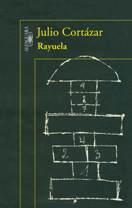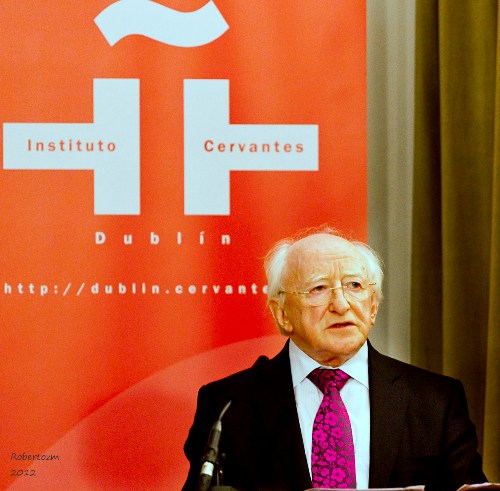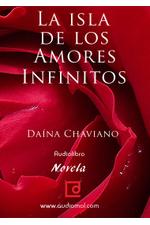Blog del Instituto Cervantes de Dublín
Torre Martello
Isla Literary Festival 2013 / Festival Isla de Literatura 2013
 Instituto Cervantes Dublin is pleased to present the second edition of the Isla Festival of Literature.
Instituto Cervantes Dublin is pleased to present the second edition of the Isla Festival of Literature.
This is a unique opportunity to attend a gathering of Irish and Hispanic literature where you will enjoy round tables, readings and other parallel events during three consecutive days. This year, on the second edition of this festival we will have 16 authors from Argentina, Chile, Cuba, Ireland, Mexico and Spain. Poetry, novel, essay, theatre and cinema will be the main characters of a pluralistic program for all audiences.
The ISLA Festival or Irish, Spanish and Latin American Literary Festival is a cultural initiative in Ireland carried out by the Instituto Cervantes Dublin in collaboration with the Embassies of Argentina, Chile, Cuba, Spain and Mexico, as well as Dublin UNESCO City of Literature, Ireland Literature Exchange, Poetry Ireland and with kind support of Dublin City University, Trinity College Dublin, NUI Galway and NUI Maynooth.
Poco más de un mes para que de comienzo el Festival Isla de Literatura 2013. En este festival reuniremos a dieciséis escritores de Irlanda, España y Latinoamérica, tres días consecutivos con mesas redondas, lecturas y otros eventos paralelos. En esta edición, contaremos con 16 autores provenientes de Argentina, Chile, Cuba, Irlanda, México y España. Poesía, novela, ensayo, teatro y cine, serán los protagonistas de un programa plural y para todos los públicos.
El Festival ISLA (Irish Spanish Latin American Literary Festival) es una iniciativa cultural puesta en marcha en Irlanda por el Instituto Cervantes de Dublín con la colaboración de las Embajadas de Argentina, Chile, Cuba, España y México, Dublin UNESCO City of Literature, Ireland Literature Exchange, Poetry Ireland y el apoyo de las universidades Dublin City University, Trinity College Dublin, NUI Galway y NUI Maynooth.
50 years playing Hopscotch / 50 años jugando a la Rayuela
Se cumple este año el 50 aniversario de Rayuela, una de las obras maestras de la novela latinoamericana. Celebramos esta fecha en la biblioteca nombrando al escritor argentino Julio Cortázar nuestro autor del mes.
Hijo de un diplomático argentino, Julio nació en Ixelles en 1914 y murió en París en 1984. Está considerado como uno de los autores más innovadores y originales de la literatura moderna. Fue un maestro en el relato corto, la prosa poética y la narración breve en general, a la altura de escritores como Jorge Luis Borges, Antón Chejov o Edgar Allan Poe.
Creó una serie de relatos y novelas que supusieron una nueva forma de hacer literatura en la narrativa mundial, rompiendo las pautas clásicas mediante narraciones que escapan de la linealidad temporal y donde los personajes adquieren mayor autonomía y profundidad psicológica. Con frecuencia sus personajes transitan entre lo real y lo fantástico. De hecho, el surrealismo es una de las corrientes que está presente en la mayoría de su obra.
Todos estos elementos encuentran su mayor exponente en Rayuela, una de las novelas claves del boom latinoamericano que cincuenta años más tarde sigue manteniendo la misma frescura y modernidad de su estreno.
Hopscotch (Rayuela), one of the masterpieces of Latin American novel celebrates its 50th anniversary and on this ocasion, his author, Julio Cortázar, is our author of the month in June.
He is considered one of the most innovative and original writers of modern literature. Cortázar was a master of short-stories, poetic prose and short narrative, equal to other great writers as Jorge Luis Borges, Antón Chejov or Edgar Allan Poe.
He created a number of short-stories and novels that led to a new form of making literature worldwide, breaking the classic rules through narrations that escape temporal lineup and where characters gain more autonomy psychological depth. His characters often pass through the real and the fantastic. In fact, surrealism is an element that is present in most of his work.
All these elements find its best exponent in Hopscotch, one of the key novels of Latin American boom. Fifty years later it’s still keeping the same freshness and modernity.
[Video] Entrevista a Juan Gabriel Vásquez / Interview with Juan Gabriel Vásquez
Juan Gabriel Vásquez es uno de los mejores novelistas de su generación, y El ruido de las cosas al caer, que aborda el devenir de Colombia durante la época de Pablo Escobar, es una de sus grandes novelas.
El pasado mes de noviembre, tuvimos la suerte de recibir a Juan Gabriel Vásquez en el Instituto Cervantes de Dublin, donde presentaró y leyó algunos fragmentos de su libro. El autor colombiano fue entrevistado por la periodista de RTE Paula Shields y a continuación mantuvo un animado debate con el público.
En este video, nuestro compañero Sergio Angulo charla con él acerca de El Ruido de las cosas al caer, Premio Alfaguara de Novela 2011, que ahora ha sido traducida al inglés.
Juan Gabriel Vásquez (Bogotá, Colombia, 1973) estudió derecho en su ciudad natal y más tarde se doctoró en Literatura Latinoamericana en La Sorbona. Actualmente reside en Barcelona. Es autor de tres novelas “oficiales” —Los informantes, Historia secreta de Costaguana y El ruido de las cosas al caer—, aunque escribió otras cuando tenía 23 y 25 años de edad, que él prefiere eliminar. Sus novelas han sido traducidas en Inglaterra, Francia, Holanda, Italia y Polonia.
Juan Gabriel Vasquez is one of the leading novelists of his generation, and The Sound of Things Falling that tackles what became of Colombia in the time of Pablo Escobar is his best book to date.
We are so lucky to have him at the Instituto Cervantes Dublin, where he introduced and read an extract of his book and he was interviewed by RTE journalist Paula Shields.
Juan Gabriel Vásquez (Bogotá, Colombia, 1973) studied law in his hometown and obtained a phd in Latin American Literature in the Sorbone University. At present he lives in Barcelona. He has published three “official” novels – The informers, The secret history of Costaguana and The Sound of Things Falling— however he wrote others at the age of 23 and 25 which he prefers to omit. His works have been translated in England, France, Netherlands, Italy and Poland.
El presidente Michael D. Higgins en el Instituto Cervantes de Dublín / President Michael D. Higgins in the Instituto Cervantes in Dublin
El presidente de Irlanda, Michael D. Higgins, inauguró oficialmente la primera edición del Festival ISLA de Literatura el pasado 2 de noviembre en el Instituto Cervantes de Dublín. y con ello contribuyó de manera decisiva a su éxito. El festival, por el que pasaron a lo largo del fin de semana cerca de mil asistentes, reunió a escritores de Argentina, Chile, Cuba, México, Irlanda y España en torno a una serie de lecturas, mesas redondas y proyecciones cinematográficas.
El presidente habló ante una sala abarrotada con cerca de 200 personas y les dio la bienvenida en español, irlandés, e inglés. Después de saludar a los asistentes, centró su alocución en los recuerdos de su reciente viaje diplomático por América Latina.
«He regresado recientemente de mi visita a Chile, Brasil y Argentina, una parte del mundo que tiene un lugar especial en mi corazón», dijo Higgins. «Durante este viaje, me llamó la atención una vez más la profundidad del compromiso con la cultura y la literatura irlandesa que existe en América Latina y cómo nuestras dos tradiciones se han influido y enriquecido mutuamente».
Higgins habló después sobre el papel que la escritora Kate O’Brien ha jugado en la literatura irlandesa y española, y la intensa conexión de la autora con España.
El amor del presidente por la poesía también se hizo evidente cuando aplaudió el énfasis que el Festival ISLA de Literatura hizo sobre este género en su programa. «Estoy impresionado por la profundidad y la fuerza de la poesía en este programa. Seamus Heaney, en su magnífica colección de ensayos «The Redress of Poetry», habla de cómo la poesía equilibra «la balanza de la realidad hacia un cierto equilibrio trascendente». El festival ISLA, con sus fuertes elementos interculturales, y los muchos poetas representados en él, como Maighread Medbh y Lorna Shaughnessy, parece tener esa inventiva deliciosa de la que Heaney habla en su obra».
El presidente finalizó leyendo el poema de Oliver St. John Gogarty «An Long» primero en lengua irlandesa y después en inglés.
Información basada en la nota de prensa de Megan Specia y Sergio Angulo.
Michael D. Higgins launched the first Irish, Spanish, and Latin America (ISLA) Literary Festival on the evening of November 2 in the Instituto Cervantes in Dublin. The festival, which brought together writers from Argentina, Chile, Cuba, Mexico, Ireland and Spain, was held over the weekend and featured a series of readings and round table discussions.
The President spoke to a crowd of approximately 200 participants and welcomed them in Spanish, Irish, and English. After greeting the crowd, he spoke to those gathered about a recent diplomatic trip to Latin America.
“I have recently returned from visiting Chile, Brazil, and Argentina, a part of the world which has a cherished place in my heart,” said Higgins. “During these visits, I was struck again by the depth of the engagement with Irish culture and writing that exists in Latin America and how our two traditions have influenced and enriched each other.”
Higgins went on to speak about the role than writer Kate O´Brien has played in Irish and Spanish literature, and the intense connection of the author to Spain.
The President´s love of poetry was also evident when he applauded ISLA´s emphasis on the genre. Said Higgins, “[I am] impressed by the depth and strength of poetic representation in the programme. Seamus Heaney, in his great collection on ´The Redress of Poetry´, speaks of how poetry balances ´the scales of reality towards some transcendent equilibrium´. The ISLA festival, with its strong intercultural elements, and the many poets represented like Maighread Medbh and Lorna Shaughnessy … would seem to have that self-delighting inventiveness of which Heaney speaks.”
He closed by reading Oliver St. John Gogarty´s poem “An Long” (The Ship) first in the Irish language and then in English.
Megan Specia & Sergio Angulo
Festival Literario ISLA / ISLA Literary Festival
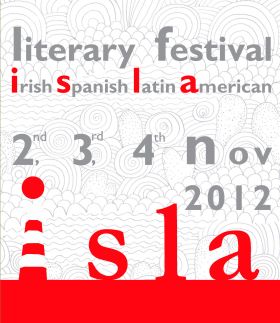 Irlanda es una isla grande y fértil. Una isla sembrada de escritores y de buena literatura. Un escritor, en algún momento de su labor creativa, también ha de convertirse en una isla, retirarse en silencio hasta el lugar en donde se encuentran las palabras, esas mismas palabras que luego descubrirá algún lector solitario, como un tesoro en una isla pirata, un tesoro en forma de libro.
Irlanda es una isla grande y fértil. Una isla sembrada de escritores y de buena literatura. Un escritor, en algún momento de su labor creativa, también ha de convertirse en una isla, retirarse en silencio hasta el lugar en donde se encuentran las palabras, esas mismas palabras que luego descubrirá algún lector solitario, como un tesoro en una isla pirata, un tesoro en forma de libro.
Un buen libro es una isla que contiene el universo.
ISLA es también el nombre que hemos querido dar a nuestro festival de literatura. Es el acrónimo de “Irish, Spanish and Latin American” Literary Festival. Es por tanto, también, una ISLA grande, fértil y multicultural en la que estamos todos unidos, irlandeses, latinoamericanos y españoles, por primera vez, en torno a la literatura.
Nunca antes se había celebrado un festival de estas características. Sin embargo, creemos que hacía ya mucho tiempo que venía siendo necesario. Hoy, gracias al entusiasmo demostrado tanto por Dublin UNESCO City of Literature, Ireland Literature Exchange, Poetry Ireland y el apoyo de las universidades Dublin City University, NUI Galway, NUI Maynooth y Trinity College Dublin, como por las embajadas de Argentina, Chile, Cuba, México y por supuesto por la Embajada de España, de la que el Instituto Cervantes forma parte, este festival es una realidad. Solo podemos tener palabras de agradecimiento para todos ellos.
Y aquí estamos todos, unidos en este proyecto. Comprometidos, comunicados, reunidos en este hermoso territorio común en el que hemos depositado tantas ilusiones.
No tiene sentido que algunas de las literaturas más fecundas del planeta sigan viviendo de espaldas entre sí. Es necesario que del intercambio de experiencias e ideas, de un mejor conocimiento entre unos y otros surjan nuevas traducciones, nuevos libros y, sobre todo, nuevos lectores.
Bienvenidos a nuestra ISLA.
Ireland is a great and fertile Island. It is an Island cultivated with writers and high quality literature. A writer during the course of his creative work must also become an island, withdrawing in silence to a place where words are kept. Those same words which some solitary reader will discover like hidden treasure on a pirate island, treasure in the form of a book.
A good book is a universe within an island.
The Spanish for ‘island’ is ‘ISLA’. It is the name we have chosen for our Literary Festival. It is the acronym for ‘Irish, Spanish and Latin American’ Literary Festival. It is also in that way a great, fertile and multicultural island where the Irish, Latin Americans and Spanish for the first time are all united and gathered around literature.
Never before has such a festival taken place. However, we believe it to be a much needed, unique event that has been a long time coming. Today, and thanks to the enthusiasm of Dublin UNESCO City of Literature, Ireland Literature Exchange, Poetry Ireland and the support of Dublin City University, Trinity College Dublin, NUI Galway, NUI Maynooth, the Embassies of Argentina, Mexico, Chile and Cuba, and by the Spanish Embassy, of which Instituto Cervantes is a part, this Festival is now a reality. We can only offer words of sincere gratitude to all of them.
We are all here, united in this project. Committed, connected and gathered together in this beautiful shared place where we have invested so many dreams.
It does not make sense that some of the most fertile literary figures on the planet should live in disregard for one another. It is imperative that from the exchange of experiences and ideas and from a better understanding between one another, new translations, new literature and, above all, new readers should emerge.
We wish you a warm welcome to our ‘island’ ISLA.
Encuentro Literario con Mario Vargas Llosa / Literary evening with Mario Vargas Llosa
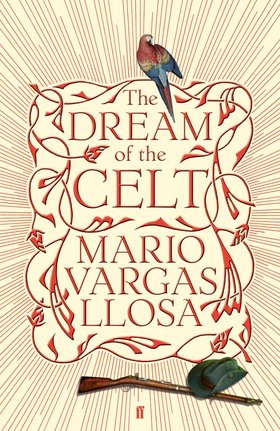 Premio Nobel de Literatura en 2010, Premio Cervantes en 1994, Premio Príncipe de Asturias de las Letras en 1986… éstos son tres ejemplos de los muchos reconocimientos que ha recibido a lo largo de su carrera como escritor Mario Vargas Llosa, uno de los más importantes novelistas y ensayistas contemporáneos. El Instituto Cervantes de Dublín se complace en invitarte a asistir a una conversación entre este magnífico escritor y Juan Cruz.
Premio Nobel de Literatura en 2010, Premio Cervantes en 1994, Premio Príncipe de Asturias de las Letras en 1986… éstos son tres ejemplos de los muchos reconocimientos que ha recibido a lo largo de su carrera como escritor Mario Vargas Llosa, uno de los más importantes novelistas y ensayistas contemporáneos. El Instituto Cervantes de Dublín se complace en invitarte a asistir a una conversación entre este magnífico escritor y Juan Cruz.
Mario Vargas Llosa, nuestro autor del mes de junio, nació en 1936 en Arequipa (Perú). En 1959 viajó a España gracias a una beca para hacer un doctorado en la Universidad Complutense de Madrid, donde obtuvo el título de Doctor en Filosofía y Letras.
Ese mismo año, vio la luz su primera publicación, Los jefes, un conjunto de cuentos que obtienen el Premio Leopoldo Alas. Sin embargo, no será hasta la década de 1960 cuando publique tres de las obras que lo lanzaron a la fama: La ciudad y los perros (1962), La casa verde (1965) y Conversación en La Catedral (1969).
En 2010, la editorial Alfaguara publica El sueño del celta, en la que se cuenta la peripecia vital de un hombre de leyenda: el irlandés Roger Casement, uno de los primeros europeos en denunciar los horrores del colonialismo. Esta novela, traducida al inglés, ha sido publicada por la editorial Faber and Faber a principios de junio de 2012 bajo el título The dream of the celt.
Mario Vargas Llosa conversará con Juan Cruz, periodista y escritor español que en la actualidad ocupa el cargo de adjunto a la dirección del diario El País. Su primera novela fue publicada en 1972 bajo el título Crónica de la nada hecha pedazos. Ha participado en radio y televisión y también en numerosas conferencias y cursos.
Para asistir a este encuentro es necesario presentar invitación. Para conseguirla, pregunta por favor al bibliotecario: bibdub@cervantes.es. ¡Pero date prisa, que se acaban!
Nobel Prize in Literature 2010, Cervantes Award 1994, Príncipe de Asturias de las Letras Award 1986… three examples of the many awards that Mario Vargas Llosa has received during his writing career. He is one of the most significant contemporary novelists and essayists. Instituto Cervantes Dublin is proud to invite you to a conversation with this outstanding author and the Spanish writer Juan Cruz.
Mario Vargas Llosa, our author of the month in june, was born in 1936 in Arequipa (Peru), travelled to Spain in 1959 thanks to a bursary to complete a doctorate by the Complutense University of Madrid where he was awarded a Doctorate in Philosopy and Literature.
On the same year, he published his first work, Los jefes (The leaders), a compilation of stories. He was awarded the Leopoldo Alas prize for this piece. It is not, however, until the 60´s when he published three of the works that launched him to fame: La ciudad y los Perros (The City and the Dogs) in 1962, La casa verde (The Green House) in 1965 and Conversación en La Catedral (Conversation in the Cathedral) in 1969.
Following a period of intense political activity, he returned to writing in 1993 with his book of memoirs El pez en el agua (A Fish in the Water).
Alfaguara publishing house launched El sueño del celta in 2010. This is Vargas Llosa’s latest novel where he tells the life story of a legendary man: the Irish Roger Casement, one of the first Europeans to denounce the horrors of colonialism. This novel has been translated into English and is due to be published by Faber and Faber at the beginning of June 2012 with the title The dream of the Celt.
Juan Cruz, Spanish journalist and writer, is Assistant Director at the Spanish newspaper El País. His first novel was published in 1972 with the title Crónica de la nada hecha pedazos. He has participated in radio, television and in numerous conferences and courses.
Please remember: Strictly by invitation. Ask the librarian for details: bibdub@cervantes.es
Audiolibro de la semana / Audiobook of the week: La isla de los amores infinitos
La isla de los amores infinitos. Esta novela, de tan sugerente título, es nuestra propuesta de audiolibro para esta semana. La tienes a un solo clic de distancia.
El libro cuenta la historia de tres familias de orígenes y culturas dispares que recalan en Cuba y cuyos destinos a lo largo de más de 150 años correrán parejos con los de la bella isla.
Desde el Miami actual, la historia retrocede hasta 1856, cuando entran en contacto los personajes, procedentes de China, España y África, y surge el amor, que hallará una mágica continuidad un siglo más tarde. Una hermosa historia de esperanzas y sueños rotos, de nostalgia, exilio y amores unidos por el destino.
Su autora, Daína Chaviano, nació en La Habana donde se licenció en Lengua y Literatura Inglesa. En 1979 recibió el Premio David de Ciencia Ficción por Los mundos que amo, una colección de cuentos escritos entre los 15 y los 19 años.
En 1982, la autora fundó el primer taller literario de ciencia ficción de América Latina. Más tarde, trabajó como guionista de programas televisivos para niños, jóvenes y adultos. Fue presentadora de televisión y de radio. También participó como actriz en algunas películas de cine independiente.
Mientras vivió en Cuba, publicó varias obras de ciencia ficción y fantasía. Entre sus títulos se encuentran Amoroso planeta (1983), Historias de hadas para adultos (1986), Fábulas de una abuela extraterrestre (1988), La anunciación (1990) y El abrevadero de los dinosaurios (1990).
En mayo de 1991, Chaviano se estableció en Miami, Florida (Estados Unidos), donde aún vive.
Fuera de Cuba ha publicado Confesiones eróticas y otros hechizos (poemas), País de dragones (cuentos) y el ciclo de novelas «La Habana oculta», compuesto por El hombre, la hembra y el hambre, Casa de juegos, Gata encerrada y La isla de los amores infinitos, publicada en 25 idiomas y que se ha convertido en la novela cubana más traducida de todos los tiempos.
La isla de los amores infinitos. This novel, with such a suggestive title, is the audiobook we suggest for this week. Just a click away from you.
The book tells the story of three families of diverse backgrounds and cultures that arrive to in Cuba and whose lifes along more than 150 years will run hand in hand with the history of this beautiful island.
From Miami today, history goes back to 1856 when the characters come into contact, from China, Spain and Africa, and love emerges then and a century later it finds a magic continuation. A beautiful story of hope and broken dreams, nostalgia, exile and love united by fate.
The author, Daína Chaviano, was born in Havana where he graduated in English Language and Literature. In 1979 she received the David Award for Science Fiction for her collection of stories, Los mundos que amo, written when she was a teenager.
In 1982, she founded the first science fiction writing workshop in Latin America. Later she worked as a scriptwriter for television programs for children, youth and adults. She also participated as an actress in several independent films.
While living in Cuba, Daína published several works of science fiction and fantasy. Among his titles are Amoroso planeta (1983), Historias de hadas para adultos (1986), Fábulas de una abuela extraterrestre (1988), La anunciación(1990) y El abrevadero de los dinosaurios (1990).
In May 1991, Chaviano moved to Miami, Florida (United States), where she still lives.
Since then, she has published outside of Cuba Confesiones eróticas y otros hechizos (poems), País de dragones (short stories) and the cycle of novels «La Habana oculta», composed by El hombre, la hembra y el hambre, Casa de juegos, Gata encerrada y La isla de los amores infinitos, published in 25 languages. This novel has become the most translated Cuban novel of all time.
